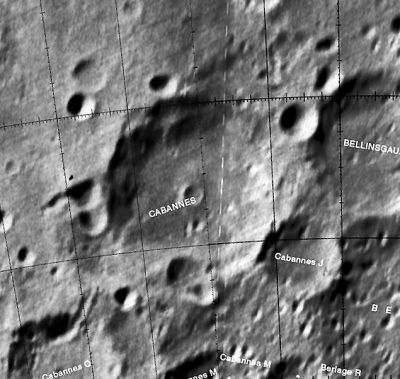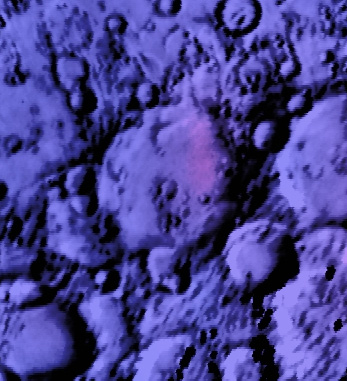Cabannes
Contents
Cabannes
| Lat: 60.9°S, Long: 169.6°W, Diam: 80 km, Depth: km, Rükl: (farside) | |
Table of Contents
Images
LPOD Photo Gallery Lunar Orbiter Images Apollo Images
Maps
([/LAC%20zone LAC zone] 133D4) USGS Digital Atlas PDF
Description
Cabanes is a crater of the [/Stratigraphy pre-Nectarian] period (~ 4.6 to 3.92 bn years) and lies not far from the centre (54.2S, 168.7W) of the [/South%20Pole-Aitken%20Basin South Pole Aitken Basin] -- a 2500 kilometre-wide of the same age. The crater's rim, as well as the terracing all around, look well worn, while the surrounding regions has suffered numerous impacts -- the largest (Cabanes J) being in the south-east. The floor of the crater is relatively flat but the southern half section looks raised slighly -- possibly due to material ejected or pushed into the area from the above-mentioned impacts. No central peak is seen in the central regions of the crater, however, this clearer PDS Map-A-Planetimage shows a small crater that appears to be connected to a hill in the south-west section. Is this any hint of a central peak that was later impacted to form the small crater shown? - JohnMoore2 JohnMoore2
Description: Wikipedia
Additional Information
Nomenclature
Jean Cabannes (August 12, 1885 - October 31, 1959) was a French physicist specialising in optics. From 1910 to 1914 Cabannes worked in the laboratory of Charles Fabry in Marseille on the topic of how gas molecules diffused light. In 1914 he showed that pure gases could scatter light. In 1925 he and Jean Dufay calculated the height of the ozone layer.
LPOD Articles
Bibliography
This page has been edited 1 times. The last modification was made by - tychocrater tychocrater on Jun 13, 2009 3:24 pm - afx3u2

